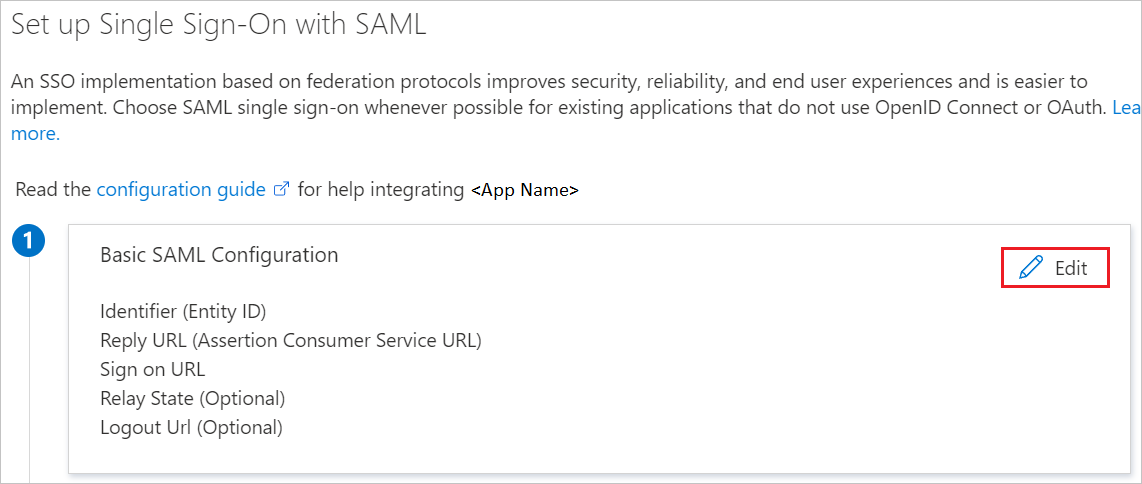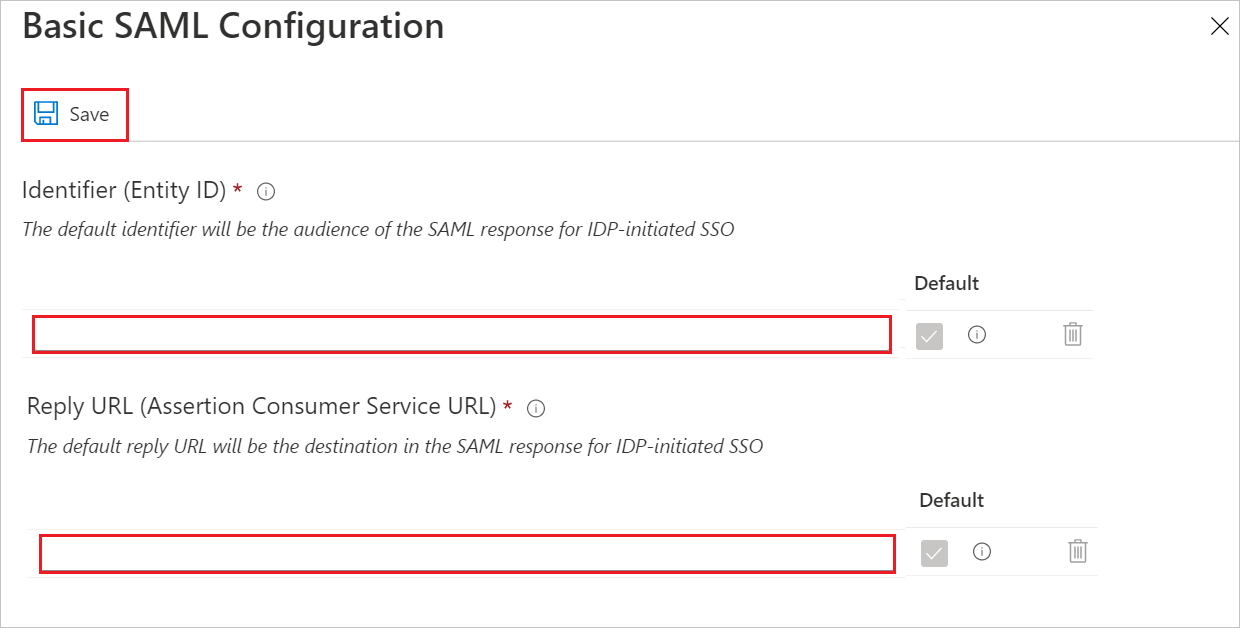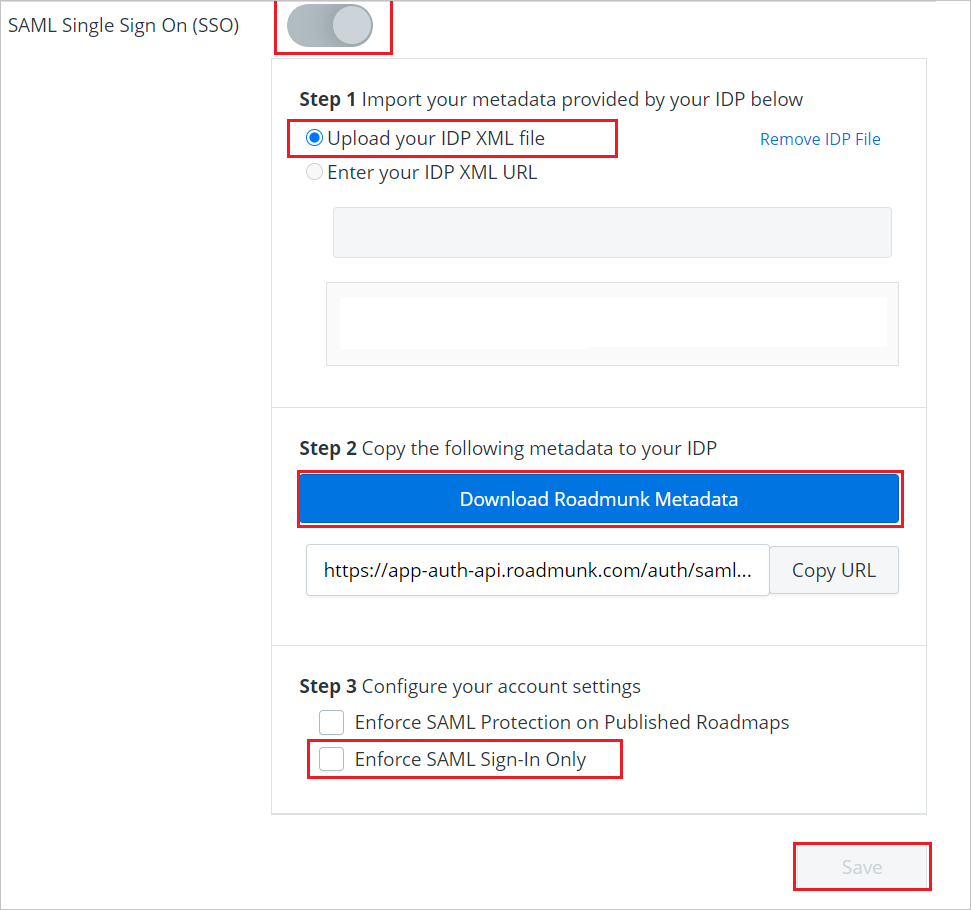Note
Access to this page requires authorization. You can try signing in or changing directories.
Access to this page requires authorization. You can try changing directories.
In this article, you learn how to integrate Roadmunk with Microsoft Entra ID. When you integrate Roadmunk with Microsoft Entra ID, you can:
- Control in Microsoft Entra ID who has access to Roadmunk.
- Enable your users to be automatically signed in to Roadmunk by using their Microsoft Entra accounts.
- Manage your accounts in one central location, the Azure portal.
Prerequisites
The scenario outlined in this article assumes that you already have the following prerequisites:
- A Microsoft Entra user account with an active subscription. If you don't already have one, you can Create an account for free.
- One of the following roles:
- A Roadmunk subscription that's enabled for single sign-on (SSO).
Scenario description
In this article, you configure and test Microsoft Entra SSO in a test environment.
Roadmunk supports SSO that's started by the service provider (SP) and by the identity provider (IDP).
Add Roadmunk from the gallery
To integrate Roadmunk into Microsoft Entra ID, from the gallery, add Roadmunk to your list of managed SaaS apps:
- Sign in to the Microsoft Entra admin center as at least a Cloud Application Administrator.
- Browse to Entra ID > Enterprise apps > New application.
- In the Add from the gallery section, in the search box, type Roadmunk.
- Select Roadmunk from the results, and then add the app. Wait a few seconds while the app is added to your tenant.
Alternatively, you can also use the Enterprise App Configuration Wizard. In this wizard, you can add an application to your tenant, add users/groups to the app, assign roles, and walk through the SSO configuration as well. Learn more about Microsoft 365 wizards.
Configure and test Microsoft Entra SSO for Roadmunk
Configure and test Microsoft Entra SSO with Roadmunk by using a test user called B.Simon. To make SSO work, you need to establish a link relationship between a Microsoft Entra user and the related user in Roadmunk.
Here's an overview of how to configure and test Microsoft Entra SSO with Roadmunk:
- Configure Microsoft Entra SSO so that your users can use this feature.
- Create a Microsoft Entra test user to test Microsoft Entra SSO by using B.Simon.
- Assign the Microsoft Entra test user to enable B.Simon to use Microsoft Entra SSO.
- Configure Roadmunk SSO to configure the SSO settings on the application side.
- Create a Roadmunk test user so that you can link the counterpart of B.Simon in Roadmunk to the Microsoft Entra representation of the user.
- Test SSO to make sure the configuration works.
Configure Microsoft Entra SSO
Follow these steps to enable Microsoft Entra SSO in the Azure portal:
Sign in to the Microsoft Entra admin center as at least a Cloud Application Administrator.
Browse to Entra ID > Enterprise apps > Roadmunk application integration page, find the Manage section, and then select single sign-on.
On the Select a single sign-on method page, select SAML.
On the Set up single sign-on with SAML page, select the pen icon for Basic SAML Configuration to edit the settings.

In the Basic SAML Configuration section, if you have an SP metadata file and you want to configure in IDP-initiated mode, follow these steps:
a. Select Upload metadata file.

b. Select the folder icon to choose the metadata file that you downloaded in step 4 of the "Configure Roadmunk SSO" procedure. Then select Upload.

After the metadata file is uploaded, in the Basic SAML Configuration section, the Identifier and Reply URL values are automatically populated.

Note
If the Identifier and Reply URL values aren't automatically populated, then fill in the values manually.
If you want to configure the application in SP-initiated mode, select Set additional URLs. In the Sign-on URL field, type
https://login.roadmunk.com
On the Set up single sign-on with SAML page, in the SAML Signing Certificate section, find Federation Metadata XML. Then select Download to download the certificate and save it on your computer.

In the Set up Roadmunk section, copy the URL or URLs that you need.

Create and assign Microsoft Entra test user
Follow the guidelines in the create and assign a user account quickstart to create a test user account called B.Simon.
Configure Roadmunk SSO
Sign in to the Roadmunk website as an administrator.
At the bottom of the page, select the user icon, and then select Account Settings.

Go to Company > Authentication Settings.
On the Authentication Settings page, follow these steps:

a. Turn on SAML Single Sign On (SSO).
b. In the Step 1 section, either upload the metadata XML file or provide the URL for the metadata.
c. In the Step 2 section, download the Roadmunk Metadata file, and then save it on your computer.
d. If you want to sign in by using SSO, in the Step 3 section, select Enforce SAML Sign-In Only.
e. Select Save.
Create Roadmunk test user
Sign in to the Roadmunk website as an administrator.
Select the user icon at the bottom of the page, and then select Account Settings.

Open the Users tab, and then select Invite User.

In the form that appears, fill in the required information, and then select Invite.
Test SSO
In this section, you test your Microsoft Entra SSO configuration by using the access panel.
In the My Apps portal, when you select the Roadmunk tile, you should be automatically signed in to the Roadmunk account for which you set up SSO. For more information, see Sign in and start apps from the My Apps portal.
Related content
After you configure Roadmunk, you can enforce session control. Session control protects the exfiltration and infiltration of your organization's sensitive data in real time. Session control extends from Conditional Access.
Learn how to enforce session control by using Microsoft Defender for Cloud Apps.